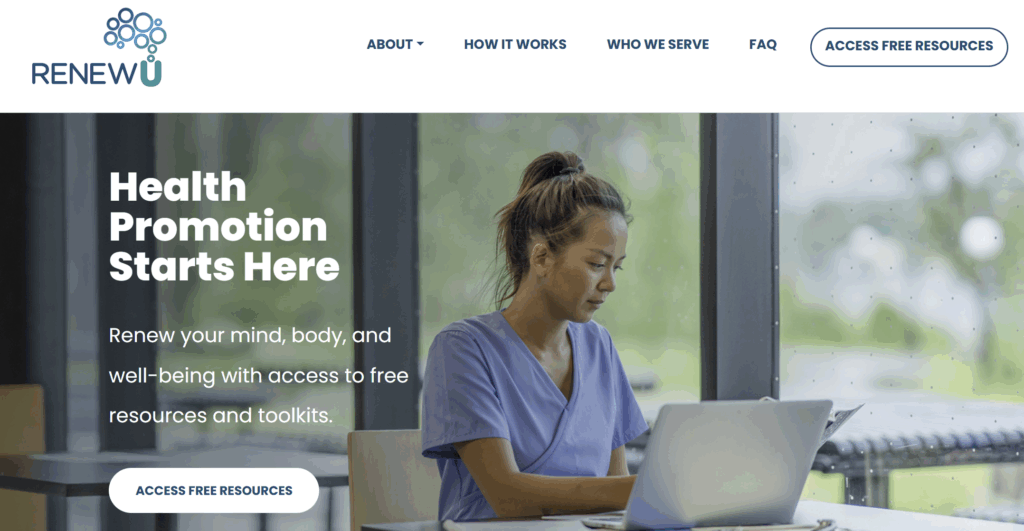Burnout among healthcare providers is at an all-time high. In 2022, 46% of health workers reported feeling burned out often or very often, up from 38% in 2018, according to a Centers for Disease Control report. To address this, faculty members from UCF’s Academic Health Sciences Center (AHSC) created the RenewU program, a free virtual toolkit designed to increase resiliency and support well-being for healthcare providers, students, clinics and hospitals.

A Toolkit Grounded in Evidence
RenewU provides 10 evidence-based interventions to prevent burnout and promote resilience in stressful and challenging environments. The program was created by faculty across UCF’s colleges of Health Professions and Sciences, Medicine and Nursing, with support from a $1.5 million grant from the U.S. Health Resources and Services Administration, which aims to decrease high burnout rates among healthcare professionals.
“Burnout has emerged as a growing epidemic among healthcare providers,” says Dr. Magdelena Pasarica, College of Medicine assistant dean for medical education, who helped create the program. “They need to manage the inherent stress of the profession through healthy behaviors. We wanted to create a virtual, free resource that will work for everyone — whether you’re in a huge academic medical center or a clinic in rural Arkansas.”
While the Internet is full of suggestions for improving mental and physical well-being, UCF’s team found that most of those recommendations were not evidence-based. Existing programs also had not been studied for effectiveness and were not designed to support interdisciplinary healthcare teams.
“Promoting health and wellness among healthcare professionals allows us to better care for our patients,” says Laurie Neely, UCF associate professor of physical therapy, who helped create RenewU. “It is also important that healthcare systems address the problem and promote a workplace that fosters health and wellness among their employees.”
“Promoting health and wellness among healthcare professionals allows us to better care for our patients,” Laurie Neely, UCF associate professor of physical therapy
Creating Interventions for Realities of Healthcare
In creating the system, the UCF team incorporated proven practices recommended by the United States Preventive Services Task Force, a scientifically independent group of national experts on disease prevention and evidence-based medicine. The toolkit includes information and guides for individuals, teams and health systems, so hospital leaders can create resiliency support for their entire workforce. Resources are provided in medical and lay terms for clinical and non-clinical workers, and include active, self-directed learning, practice activities, group interaction, and reflection opportunities. Licensed healthcare providers can even receive continuing education credits through RenewU training.
Supporting Mental and Physical Well-Being
The toolkit is divided into mental and physical wellness sections. Mental health and well-being topics cover stress management, mindfulness, psychological detachment, setting boundaries, behavioral modification and handling stress in challenging situations. Videos from mental health experts guide participants in detaching from work and responding more effectively when experiencing self-doubt or becoming overwhelmed.
“We selected these evidence-based interventions with intention, keeping in mind the fast-paced and often unpredictable nature of healthcare environments,” says Asli Yalim, associate professor in UCF’s School of Social Work and another RenewU creator. “The practices in this toolkit go beyond generic five- or ten-minute mental health tips. They offer practical, meaningful strategies tailored specifically for healthcare providers to support healthier decision-making in both work and life.”
The physical health section covers topics such as active rest, like exercising at your desk or taking a walk during breaks, along with healthy eating recipes and how-to videos from a licensed yoga instructor. Participants can watch a video on preparing baked salmon and vegetables, a meal high in Omega-3 fatty acids that support mental health, and learn which foods have the highest amounts of Omega-3s.
Feedback from UCF Students, Residents, Community Clinicians
UCF faculty piloted the program with 761 AHSC learners, including physicians training in College of Medicine-HCA Healthcare residencies. Emergency medicine residents at HCA Florida Osceola Hospital participated in the program’s yoga curriculum at a local park alongside their attending physician, Dr. Tracy MacIntosh of the College of Medicine, to test the program’s effectiveness in helping teams address burnout. The creators also shared the program with 351 healthcare workers from seven Central Florida clinical organizations. Staff at Orlando’s Grace Medical Home participated in active rest exercises during lunch and were amazed that all the physical and mental health resources are free.
In developing the program, UCF faculty evaluated the educational rigor of their content using the Kirkpatrick Model, an internationally recognized system for measuring the success of learning and training programs.
RenewU is one reason UCF received the National Award for Institutional Excellence and Innovation in Interprofessional Education from the Association of Schools Advancing Health, and it’s now integrated into the required curriculum for interprofessional education at the AHSC. As part of this year’s interprofessional education initiative, students from UCF’s College of Medicine and the University of Florida’s College of Pharmacy completed a five-week virtual course on stress management in healthcare. The Yellowdig platform played a key role in fostering learning communities across four campuses, enabling peer interaction, reflective dialogue and shared exploration of evidence-based strategies for well-being.
Findings from the resilience toolkit program have been presented at 17 national and four international scientific conferences and published in six peer-reviewed journals. Even with minimal marketing, the toolkit has been used by 2,500 people, including international healthcare workers in Canada, Ireland, Sweden and Germany.